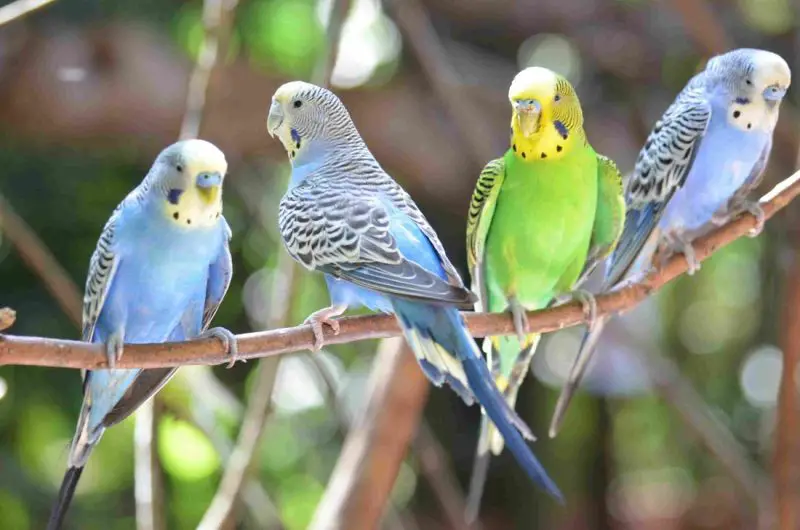Budgerigars, affectionately known as budgies or parakeets, are among the most popular pet birds in the world. In Michigan’s variable climate, proper care is essential to keep these tropical birds happy, healthy, and thriving indoors. Whether you’re a first-time owner or a seasoned bird lover, understanding the specific needs of budgies in this northern U.S. state can make all the difference.

Understanding Budgies: A Splash of the Outback in a Michigan Living Room
What Exactly Is a Budgerigar?
Hailing from the sunbaked grasslands of Australia, the budgerigar (Melopsittacus undulatus)—better known as the budgie—is a pint-sized parrot bursting with personality. In the wild, they zip through open skies in vibrant green flocks, but in homes around the world, including right here in Michigan, they’ve become beloved household companions. With their dazzling feathers, curious minds, and endearing chatter, budgies are perfectly suited for indoor life—especially in smaller homes or apartments where space is a premium.
Why Budgies Need Special Care in Michigan
Bringing a tropical bird into Michigan’s unpredictable climate comes with a few challenges. Winters here are long and harsh, and indoor air can become bone-dry from heating systems. These conditions are far removed from the warm, semi-arid world budgies are built for. Sudden temperature drops, low humidity, and lack of natural sunlight can all affect their health—causing issues from brittle feathers to breathing difficulties. That’s why Michigan budgie owners must go beyond the basics, crafting an indoor environment that’s cozy, humidified, and full of enrichment to keep these cheerful birds healthy and thriving, no matter the season outside.
Creating the Right Living Space
Cage Size and Placement
Don’t let their small size fool you—budgies are bundles of energy with wings that beg to stretch. A cramped cage can lead to stress and poor health. For a happy, healthy bird, opt for a cage no smaller than 18 inches wide, 18 inches deep, and 24 inches tall. Even better if it’s wider than it is tall, giving them room to flutter from perch to perch. Make sure the bars are spaced horizontally and close enough to prevent escape—while allowing your budgie to climb and explore with ease.
Location matters just as much. Keep the cage in a bright room where your budgie can observe daily life, but steer clear of cold drafts, radiators, and smoky kitchens. In Michigan’s icy winters, even a sunny windowsill can become dangerously chilly—so avoid placing the cage too close to exterior glass.
Perches and Toys
Perches aren’t just resting spots—they’re essential for foot health and mental stimulation. Offer several natural wood perches in varying diameters to help exercise your bird’s toes and prevent pressure sores. Toss out uniform plastic dowels, and replace them with real branches or bird-safe alternatives.
A bored budgie is a noisy or destructive one. Enrich their world with toys that engage the senses: hanging swings, jingly bells, shreddable ropes, and chew-safe blocks. Rotate toys weekly to keep things fresh and exciting.
Humidity and Temperature Control
Michigan’s winter air can be desert-dry—bad news for a tropical bird. Dry environments may lead to flaky skin, dull feathers, or even respiratory irritation. A cool-mist humidifier can help maintain ideal humidity levels between 40% and 60%. If you hear sneezing or see excessive preening, your budgie might be begging for more moisture in the air.
Temperature matters too. Aim to keep the room between 65–75°F (18–24°C). Avoid sudden temperature shifts and never place the cage near heaters or air vents. Your goal is to mimic the gentle warmth of their native land—comfortable, stable, and safe.
Feeding Your Budgie
The Basics of a Healthy Diet
Feeding your budgie well is one of the most important steps in keeping them vibrant and full of life. While Michigan pet stores carry a range of seed mixes and pellets, not all options are equal. A nutritious diet should begin with high-quality pellets—these offer balanced nutrients your budgie can’t get from seeds alone. Stick with plain, natural-colored pellets and avoid sugary or artificially colored types, which may look fun but do more harm than good.
Fresh vegetables are the next key ingredient. Offer finely chopped leafy greens like spinach, kale, or romaine, along with crunchy veggies such as carrots, bell peppers, and broccoli. Rotate what you offer to keep mealtime exciting and balanced.
Fruits can be given occasionally, more like dessert than a daily staple. Budgies enjoy apple slices (always remove the seeds), melon, berries, and banana in small amounts. Be mindful of sugar content—even natural sugars should be limited.
While seeds may be your bird’s favorite snack, they should only be a minor part of the diet. Think of them as treats, not meals—too many seeds can lead to obesity, liver problems, and nutritional deficiencies.
Water and Supplementation
Fresh water is essential every day—but especially in winter, when dry indoor air can cause water bowls to evaporate quickly. Check your budgie’s water twice a day during cold months and replace it if it appears cloudy or warm.
To support beak health and provide a natural calcium source, attach a cuttlebone to the cage. If your budgie isn’t eating pellets, consider adding mineral blocks or a vitamin supplement to their food or water. Always consult with an avian vet before introducing supplements to ensure your bird gets exactly what it needs without overdoing it.
Daily Care and Social Interaction
Mental Stimulation and Bonding
Budgies are much more than just pretty pets—they’re sharp, social, and crave interaction. Left alone too long, especially during Michigan’s long, gray winters, they can become bored or even depressed. That’s why mental stimulation is essential to their happiness and well-being.
Make it a daily habit to talk to your budgie using a calm, friendly tone. Over time, many budgies learn to mimic words and sounds. Even if they don’t talk back, they respond to your voice and energy. Allow supervised time outside the cage in a bird-safe room where they can stretch their wings and explore. Provide a rotating mix of mirrors, bells, ladders, and puzzle toys to keep their minds active.
Tame budgies may enjoy perching on your finger or shoulder, and the bond you form with them through daily contact can become incredibly strong. Regular interaction helps reduce stress, builds trust, and encourages a longer, healthier life.
Grooming and Hygiene
Budgies are naturally clean birds and spend much of their time preening to keep feathers in top condition. Still, they benefit from your help in staying fresh and healthy.
Offer a shallow dish of lukewarm water two to three times a week so your budgie can bathe. Alternatively, use a gentle spray bottle to mist them—most birds enjoy the light shower and fluff up in delight. Avoid cold water, and never bathe them in drafty or chilly rooms, especially during Michigan winters.
Cage hygiene is also vital. Change the cage liner daily, and wash food and water containers with warm, soapy water to prevent bacteria buildup. Check perches and toys regularly for waste and replace or clean them as needed.
Nail trimming may be necessary if your bird doesn’t wear them down naturally. Always consult with an avian vet or an experienced bird handler before attempting it yourself, as improper trimming can cause pain or bleeding.
Health Monitoring in Michigan’s Climate
Common Health Concerns
Michigan’s climate poses unique challenges for tropical birds like budgies, especially during the long, cold winters. Dry indoor air from heating systems can irritate their delicate respiratory system, while cold drafts from windows or doors can lead to chills and illness.
Watch closely for warning signs of health problems, including labored breathing, tail bobbing while at rest, fluffed-up feathers for extended periods, changes in droppings, or a sudden lack of appetite. These symptoms often indicate respiratory distress or other illnesses that need prompt attention.
Captive budgies are also at risk for overgrown beaks or nails, especially if they don’t have access to natural perches or toys that promote regular wear. Providing cuttlebones, mineral blocks, and textured perches can help prevent these issues.
Finding an Avian Vet in Michigan
Regular check-ups with a qualified avian veterinarian are key to keeping your budgie healthy. However, not all vets are trained to treat birds, so it’s important to identify an avian specialist before a medical emergency arises.
In Michigan, cities like Ann Arbor, Grand Rapids, Detroit, and Lansing often host veterinary clinics with avian-certified professionals. It’s a good idea to call ahead, confirm their expertise, and keep their contact information handy.
If you’re in a rural area, consider asking local bird clubs or exotic pet stores for recommendations. Being prepared can make all the difference when your budgie needs urgent care.
Breeding and Legal Considerations in Michigan
Can You Breed Budgies at Home?
Budgies are prolific breeders, and with the right conditions, a pair can quickly produce multiple clutches of chicks. However, successful breeding requires more than just putting two birds together. You’ll need additional cages for separating chicks and parents, proper nesting materials, and a solid understanding of budgie genetics and chick development.
In Michigan, it is legal to breed budgies in your home for personal enjoyment. However, local zoning laws, homeowner association rules, or rental agreements may limit or prohibit animal breeding on residential property. Before you begin, check with your city ordinances or landlord to avoid potential legal trouble.
Pet Licensing and Exotic Animal Rules
Budgerigars are considered domesticated pets and are not classified as exotic or wild animals under Michigan state law. This means you don’t need a special license just to keep them.
However, if you plan to own a large flock, sell chicks, or become a licensed breeder, you may need to apply for a small animal permit or business license, depending on your location. Check with your local animal control or municipal clerk’s office for the most accurate, up-to-date requirements.
Budgies and Michigan Seasons: Keeping Them Comfortable Year-Round
Michigan’s distinct seasons bring a wide range of temperature and humidity changes that can affect your budgie’s comfort and health. From freezing winters to humid summers, small adjustments can make a big difference in helping your feathered friend thrive indoors.
Winter Tips: Keeping the Chill at Bay
Michigan winters can be harsh, and budgies—being tropical birds—are sensitive to cold drafts and dry air. Here’s how to protect them when temperatures drop:
-
Position the cage wisely: Keep it away from windows, exterior walls, and drafty doors. Even indoor chills can stress your budgie or lead to illness.
-
Maintain a steady room temperature: Budgies do best between 65–75°F (18–24°C). If needed, use a space heater or ceramic heat emitter—but ensure it doesn’t overheat the room or dry the air too much.
-
Avoid nighttime temperature swings: Sudden drops in temperature after sunset can be dangerous. Covering the cage with a breathable blanket at night can help insulate warmth and create a sense of security.
Summer Advice: Beating the Heat Safely
Though summers in Michigan aren’t tropical, indoor temperatures can rise quickly—especially in non-air-conditioned homes. Here’s how to keep your budgie cool:
-
Keep the cage shaded and ventilated: Avoid placing the cage in direct sunlight or stuffy corners. Use fans to circulate air, but never aim them directly at the bird.
-
Provide fresh water and bathing options: Offer clean water twice a day, and consider placing a shallow bath inside the cage or misting your budgie with cool water. This helps regulate their body temperature.
-
Watch for signs of overheating: If your budgie is panting, holding its wings away from its body, or acting lethargic, it may be too hot. Move the bird to a cooler area immediately.
Conclusion: A Cheerful Companion for All Seasons
Budgies may be tropical at heart, but with the right care, they adapt wonderfully to Michigan homes. Their cheerful chirps, playful personalities, and bright colors bring warmth even in the coldest months. Whether you’re welcoming your first budgie or enhancing your care routine, a thoughtful, well-prepared approach will keep your feathered friend healthy and happy through all of Michigan’s changing seasons.






